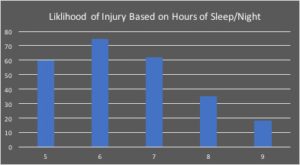“The foundations of good health are good diet, good exercise and good sleep, but two out of three doesn’t get you there,”
— Dr. Anne Calhoun, neurology professor, University of North Carolina.
Sleep can frequently be taken for granted and forgotten as an effective way to improve and not detract athletic performance. For myself, a workaholic that is either treating/training clients or training myself, I always consider recovery a top priority so I can continue to put my best effort in each day. Although I don’t always allow myself what I consider the minimum required sleep, knowing the effects of missing or hitting the mark is key as it oftentimes could help explain why you are or are not hitting your athletic goals. Everything from clear thinking, sound decision making, digestion and athletics can be improved with quality sleep.
Result of Sleep Deprivation

Likelihood of Injury
Athletes who sleep on average <8 hours per night have 1.7 times greater risk of being injured than those who slept ≥8 hours per night. Milewski et al. shows this over a period of 21 months.¹ Notice the large drop off in likelihood with 8-9 hours of sleep.
Testosterone
Sleep deprivation is associated with reduced testosterone but normalizes when you get enough rest. Testosterone is the quintessential anabolic hormone and is responsible for increased muscle mass and strength as well as reduced adipose (fat) tissue. Whether your goal is to increase athletic performance, gain muscle mass or maintain your current status, adequate testosterone is an essential piece to the equation.²
Growth Hormone
Growth hormone, among other roles, serves to protect and grow the structure of tendons and muscle. Lack of sufficient sleep or changes in sleep habits can change the normal cycle of growth hormone (GH) production. With reduced sleep, GH production decreases. The human body compensates for this altered pattern by increasing production during waking hours. Normally, the human body produces 50% of the daily growth hormone during early moments of falling asleep. Although the human body creates more during waking hours, research is still required to assess if the absorption rates change.³
Food Intake
Reduced sleep can increase food intake. Although this decrease does not directly reduce metabolic rate, it typically results in decreased physical activity and therefore reduced metabolic rate.
Consistency
Missing one night of sleep may not have adverse effects on athletic performance however the chronic effect in adolescence may.
Many of my clients strive to take full advantage of what is in their control, whether it is good movement, clean diet, quality night sleep or a great game on the field. Realistically, guiding each athlete to promote quality and consistently of habits has shown us the greatest improvement. I know that school work, a job or other life events may pull you off the path for a day here and there but the most important thing is to get right back to the good habits that have been developed with forward progress to the goal you are working towards.
Practical Checklist for Improving Quality of Sleep
Here is an easy action guide to improving overall sleep quality.
- Quiet environment
- Maintain comfortable room temperature
- Ensure bedding/clothing is not too warm or restricting
- Sleep routine: keep it consistent with the time you go to sleep and wake up
- Avoid caffeine and food/fluid intake leading up to sleep
- Avoid using tv/phone before bed
- Napping no later than mid-afternoon
- At least 8 hours of sleep/night
- Ensure a dark room with no light present
Sign up for our FREE Newsletter
Recieve performance physical thearpy, nutrition and training tips!
You have Successfully Subscribed!
References
- Milewski, M., Skaggs, D., Bishop, G., Pace, L., Ibrahim, D., Wren, T., & Barzdukas, A. (2014). Chronic Lack of Sleep is Associated With Increased Sports Injuries in Adolescent Athletes. Journal of Pediatric Orthopaedics, 34(2), 129-133.
- Reynolds AC, et al. Impact of five nights of sleep restriction on glucose metabolism, leptin and testosterone in young adult men. PLoS One. (2012)
- Brandenberger G, Weibel L. The 24-h growth hormone rhythm in men: sleep and circadian influences questioned. J Sleep Res. (2004)
- Nedeltcheva AV, et al. Sleep curtailment is accompanied by increased intake of calories from snacks. Am J Clin Nutr. (2009)

